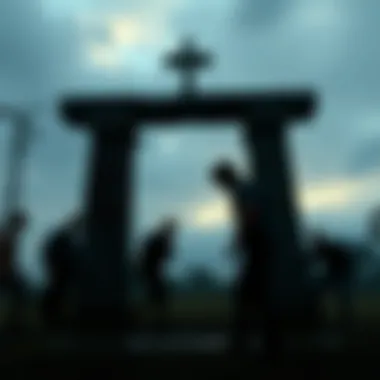Exploring Future Seasons of The Walking Dead Franchise


Intro
The television landscape has seen its fair share of groundbreaking series, but few have reshaped the horror genre quite like The Walking Dead. Spanning over a decade, the franchise has become a cultural phenomenon, keeping viewers riveted with its mix of human drama and terrifying situations. As the show wraps up its original run, anticipation mounts for what the future holds. What can fans expect in terms of new seasons and story arcs? This article will dissect those possibilities while exploring the implictations of the show’s conclusion.
The buzz among dedicated followers of the series is palpable, with whispers of potential spin-offs and continued storylines. We will dive into the latest developments, explore expected narrative paths, and analyze the profound impact this series has had on television as a whole.
News Updates
Latest Announcements
The world of The Walking Dead is anything but quiet as it nears the end of a significant chapter. Recently, showrunners and network executives have hinted at multiple spin-offs focusing on beloved characters, which offers something to look forward to after the series finale.
- Daryl's Journey – One of the most anticipated projects features a deep dive into Daryl Dixon's post-apocalyptic life. Fans have long cherished his character, and his upcoming solo series is expected to answer many lingering questions.
- Carol's Legacy – Another tantalizing addition is the Carol-centric spin-off. Rumors suggest it will explore her transformation and survival skills, providing insight into what makes her such a resilient character in this desperate world.
Release Dates
While official release dates remain under wraps, insiders suggest that the first of these spin-offs could hit screens in late 2024. This is something to keep an eye on, as fan interest is swelling.
Industry Events
The Walking Dead has been a staple topic at various conventions, particularly at events like San Diego Comic-Con. Such gatherings have consistently hosted panels that excite both seasoned fans and newcomers to the franchise. With the conclusion of the main series, we expect future conventions to delve deeper into character explorations and narratives, possibly previewing the new installments.
Reviews and Recommendations
Audience Reception
As the series shifts to the shadows, taking a look back at its milestones can provide a clearer view of what might come next. Reception has been mixed over the years, yet the series consistently lands big ratings throughout its run.
- Pros: Strong character development, intricate plotlines, and a unique blend of horror and drama.
- Cons: Some seasons have struggled with pacing and coherence, leading to diverse opinions among the viewership.
Spin-off Recommendations
Fans eager for more zombie tales can break into this list:
- Fear The Walking Dead – A prequel series providing a fresh angle on the early days of the outbreak.
- The Walking Dead: World Beyond – This offshoot dives into a younger generation’s struggles, highlighting societal ramifications.
Trending Topics
Social Media Buzz
Fans are vocal on platforms like reddit.com, where discussions rage over potential plot points and character arcs. Hashtags like #TWD and #WalkingDead have surged, showcasing the fervor of the fanbase.
Controversies and Debates
The concept of spin-offs brings forth debates. Some question whether the franchise can remain compelling without its original main cast, while others are excited about new storytelling opportunities. The discourse around adding depth to existing characters and narratives is lively, indicating strong engagement from the community.
Epilogue
With the conclusion of The Walking Dead, the franchise is at a critical juncture. The potential for future seasons and stories offers an exciting avenue for exploration, while it also carries the weight of high expectations and nostalgia. As production gears up for more adventures in this grim world, fans must prepare for a new era of survival, challenges, and the human experience amid the chaos. Keep an eye on official channels for upcoming announcements that could shape the next chapter in this epic saga.
Foreword to The Walking Dead
In the realm of popular culture, few series have managed to carve out a legacy as impactful as The Walking Dead. From its debut in 2010, the series quickly morphed from a niche genre based on a comic book to a global phenomenon that transcended television. The importance of discussing this franchise lies not just in its past accolades but also in its potential future - especially as fans continue to anticipate new seasons and spin-offs.
This show painted a vivid picture of survival amidst chaos, stirring discussions on human resilience, morality, and the darker aspects of society. Each character, from Rick Grimes to Daryl Dixon, has woven intricate narratives that have not only entertained but also pushed audiences to reflect on their own values and choices when faced with adversity.
Understanding the series' significance helps highlight the emotional connections fans have formed. The decay of society, the struggle of communities, and the ongoing battle against the undead have resonated surprisingly well with viewers, making the series a staple in modern horror. However, each season left fans hungry for more, prompting discussions about future seasons and how the story might evolve.
"The Walking Dead challenges viewers to ponder: What does it really mean to survive?"


Moreover, it sets the stage for exploring potential storylines that could emerge in forthcoming seasons. As we navigate the intricate webs of character arcs, fan theories, and the anticipated expansion of the universe, it's crucial to delve into how the show's themes might shape its future.
Through this article, we aim to unravel not only the current status of The Walking Dead but also its future directions. Understanding the groundwork laid by previous seasons provides insight into what fans might see as new seasons unfold.
In tone with the current trends in entertainment, this narrative will also consider how the series adapts to modern storytelling techniques and audience expectations. By examining where The Walking Dead has been, we can better anticipate its evolution in an era rife with stories of human endurance set against the backdrop of horror.
Current Status of the Series
The status of The Walking Dead series is crucial for understanding its future trajectory. With a vast universe that has expanded beyond the television screen, fans are eager to know where the saga stands today. The show's current phase not only reflects on its accomplishments and distinct storytelling but also sheds light on what viewers can expect moving forward. This section aims to provide comprehensive insights into the completed seasons and highlights from the final season, setting the stage for potential new seasons.
Overview of Completed Seasons
The journey of The Walking Dead began with its inaugural season, gripping audiences with its portrayal of survival amid a zombie apocalypse. Over the years, the series evolved from a simple tale of survival into a complex narrative interwoven with themes of humanity, morality, and redemption.
- Diverse Storytelling: Each season has brought forth diverse narratives, introducing numerous characters that meet both exhilarating and heartbreaking fates. From Rick Grimes' evolution as a leader, to the emergence of villains like Negan and Alpha, the series has consistently kept viewers on the edge of their seats.
- Character Development: The arc of beloved characters often became central to the plot’s progression. For instance, Michonne's evolution from a solitary warrior to a vital member of the community encapsulates the very heart of the show’s intent.
- Reception: Completed seasons have received varied feedback from critics and fans alike. Some celebrated the emotional depth, while others critiqued certain pacing and character decisions. Despite this, the franchise remains a cultural touchstone, garnering viewership that spans across borders.
Final Season Insights
As the curtain has fallen on the final season, numerous facets have come to light, revealing not just how the story concluded, but what that means for its legacy.
- Themes of Closure: The final chapters have emphasized closure, wrapping up long-standing narratives while introducing new challenges for remaining characters. The juxtaposition of loss and hope resonates with viewers, leaving a lasting impact.
- Character Resolutions: Anticipation regarding which characters would meet their ends shaped discussions during this season. The fates of fan-favorite characters left many anxious and emotionally invested, driving viewership.
- Production Quality: There have been noteworthy advancements in production during this last season. The creation of more intense and dramatic scenarios, enhanced visual effects, and engaging storytelling elevated the series to meet modern standards.
In the ever-evolving landscape of television, The Walking Dead has not just survived; it has thrived, leaving an indelible mark on viewers and the horror genre itself.
In summary, the current status of The Walking Dead is marked by a sense of completion and a forward-looking perspective. The insights gleaned from its completed seasons and the final delivery provide a solid foundation to explore what lies ahead in this expansive franchise.
Potential New Seasons
The future of The Walking Dead franchise is more than just speculation; it stands at a crossroads of potential growth and new stories waiting to be told. As we look into the horizon of anticipated new seasons, we must consider the significance of what these seasons could bring to the already rich tapestry of the series. The importance of exploring new seasons lies not only in the opportunity to expand character arcs but also in refreshing the overall narrative and allowing for deeper engagement with the audience.
Anticipated Season Count
Given the immense success and popularity of the franchise, many fans have pondered how many more seasons might find their way to the screen. Recently, there has been chatter among producers hinting at at least two more seasons of real substance. One can argue that revisiting iconic characters like Daryl, who has become a staple, could drag the franchise back into the limelight. A more engaging format than seasons past might even incorporate new showrunners to provide a fresh perspective. As the viewer base continues to tour through the remnants of a post-apocalyptic world, there’s potential for anywhere from two to four full-fledged seasons. Given the historical precedent within episodic TV, an evolving narrative could serve to capture both new fans and those who’ve been loyal since the outset.
Speculations on Spin-Offs
Spin-offs have become a common term in today’s television landscape, but the prospects for The Walking Dead spin-offs add a thrilling layer to the discussion. What if, instead of just extending the current story, the approach shifted towards individual character journeys? The options here are staggering: projects could unfold around lesser-known figures or even locales outside familiar settings.
- Potential Characters: Promising arcs could revolve around characters like Negan, providing a backstory that delves into his complex psychology. Many fans have already expressed interest in seeing how different factions of society cope in their own unique ways.
- Narrative Approaches: Moreover, setting spin-offs in distinct eras, such as the origin of the zombie outbreak or a glimpse into a future society reshaped by the apocalypse, could yield creative gold.
"Each spin-off is a chance to explore a different facet of life and survival in a world dominated by the undead; that’s the beauty of the franchise’s flexibility.”
The very essence of spin-offs lies in maintaining audience interest while diversifying storylines—two critical aspects that could rejuvenate the franchise as it approaches new narrative depths. As we discern the key components of impending seasons, The Walking Dead continues to adapt, allowing space for innovative storytelling long after the curtain falls on the main series.
Fan Theories and Expectations
In the world of 'The Walking Dead', fan engagement transcends passive viewership. The theories and expectations that swirl around the series enhance the overall experience, creating a community bound by speculation, hopes, and a shared understanding of the beloved characters. It’s not just about watching; it's about predicting the next twist, the next character arc. This section delves into the significance of fan theories and how they fuel anticipation for future seasons, shaping narratives before they even hit the screen.
Story Arcs Desired by Viewers
When it comes to plotlines, fans often express their desires through various forums. On platforms like Reddit, one can find rich discussions on potential outcomes—some rooted in previous seasons, while others branch out into completely new directions. One prevalent theory is the idea of crossover narratives between 'The Walking Dead' and its spinoffs. For instance, many speculate that Judith Grimes may take center stage in her own story arc, navigating a world fraught with danger and moral dilemmas, much like her father before her.
Additionally, fans have a fascination with delving deeper into the origins of certain factions. The Whisperers, for example, have sparked considerable intrigue. Viewers are curious about their backstory, culture, and how they contrive to maintain a distinct identity in a post-apocalyptic world. There’s an overwhelming interest in how future seasons may explore the tensions and dynamics between these groups, offering fresh narratives while retaining viewers' emotional investment.
Moreover, one can’t overlook the current discussions surrounding the fate of characters like Daryl Dixon. Fans theorize that Daryl may face a reckoning linked to his past, possibly delving into a more complex emotional journey driven by loss, revenge, or redemption. The desire for such explorative arcs pushes writers to tread new waters while paying homage to beloved characters.
Characters Fans Want to See Return
As the series progresses and seasons unfold, viewers are often left longing for familiar faces. The attachment formed over seasons is palpable, and certain characters remain etched in the minds of fans, demanding a return. One name that often surfaces is Rick Grimes. Even though he’s taken a hiatus, the thought of his return conjures a wave of excitement. Fans speculate on how his experiences post-survival may have changed him and what role he could play in future conflicts.
Another character on fans' wish lists is Maggie Green. Her journey from grief to leadership was compelling, and many hope to see her reclaim the spotlight, possibly even stepping into a more authoritarian role. There’s a strong belief that her presence could rejuvenate the dynamics within the group and revitalize both plot and character development.


Lastly, let’s not forget the fans' desire for the return of Negan. His unpredictable nature and complex morality continue to intrigue viewers. Some fans hope that future seasons will explore a redemption arc for him—his struggles with past decisions and whether he can be trusted once again.
"The beauty of a post-apocalyptic narrative is that death is never the end, but rather a new chapter in someone else's story.”
The realm of theories and expectations is vast and ever-changing within the fanbase of 'The Walking Dead'. It enriches the viewing experience as speculation takes root, intertwining paths for characters both new and old, revealing not just individual desires, but a collective yearning for compelling storytelling.
Production Insights
Understanding the production insights of a long-running series like The Walking Dead is crucial to grasp the intricate layers of creativity, challenges, and decisions that shape the show's future. Production insights shed light on how behind-the-scenes elements affect storytelling, viewer engagement, and the series’ overall trajectory. As audiences witness the final seasons unfold, it becomes increasingly pertinent to grasp the foundational aspects of how these episodes are crafted and the hurdles that must be navigated to keep the franchise alive.
Behind-the-Scenes Developments
Behind-the-scenes developments in The Walking Dead often dictate the tone and direction of the series. From the hiring process of directors to the selection of episode scripts, these decisions are pivotal. In recent times, there has been a noticeable attempt to diversify the creative team. For instance, onboarding more female directors and writers aims to bring fresh perspectives and narratives to the franchise.
In addition, locations and filming techniques have evolved, adapting to audience expectations. As fans keenly observe the aesthetic evolution, the choice of sprawling locations versus intimate settings plays a significant role in building tension and atmosphere in the visual narrative. Once upon a time, the focus was strictly on the post-apocalyptic landscape — these days, the emotional landscapes of the characters are equally crucial.
Moreover, the integration of cutting-edge technology, especially in CGI and special effects, has raised the bar for what viewers expect from a horror series. Conversations surrounding character design, especially the zombies or ‘walkers’, have intertwined with advancements in makeup and digital effects.
"Behind every compelling episode lies a myriad of decisions that dictate not just the storyline, but how audiences connect with it on an emotional level."
Challenges Faced by the Production Team
No production is without its headaches, and The Walking Dead is no exceptions. The production team faces a slew of challenges that can impact how stories are told or the pacing of episodes. One considerable hurdle is maintaining continuity after significant cast changes. As beloved characters depart or are introduced, the collective emotional impact on the audience is palpable. Balancing new arcs without losing the thread of existing storylines poses a conundrum for writers and producers alike.
Weather conditions on location often complicate shooting schedules. The series' lavish outdoor scenes can lead to delays, especially when tackling scenes meant to depict harsh climates or significant environmental changes.
Lastly, budget constraints are an ever-looming concern. The necessity to trim costs without sacrificing quality can lead to tough decisions regarding set designs or special effects. The friction between financial realities and the artistic vision can foster creative solutions, yet sometimes leads to compromise, much to the audience's chagrin.
Impact on the Television Landscape
The influence of The Walking Dead on the television landscape is as undeniable as a zombie's relentless pursuit of the living. This franchise has transformed the norms of both horror storytelling and serialized drama. With its gritty narrative style and an overarching theme of survival, the show carved a niche that many others have tried– and often failed– to replicate. Through an immersive blend of suspense and emotional depth, this series has not only captured viewers’ imaginations but also raised critical discussions about morality and human nature in extreme circumstances.
The show has set a precedent for how horror could be represented on mainstream television. Once relegated to niche audiences or late-night slots, horror now occupies prime time, thanks to the broad acceptance facilitated by The Walking Dead. Audiences appreciate that true horror doesn’t just come from jump scares or gore; it unfolds through storytelling that forces humanity to confront the darkest corners of existence.
- Revolutionizing Genre Expectations: The series has broadened what fans expect from horror. It’s not only about the monsters; it’s also about the people. Viewers now crave narratives that dive deep into character development and moral dilemmas, making the real horror the choices that people must make.
- High Production Values: The impressive production quality has raised the bar for television overall. With cinematic visuals, meticulous attention to detail in set design, and practical effects that bring the undead to life, subsequent shows have had to elevate their game, resulting in higher standards across the industry.
- Cultural Phenomenon: Beyond its narrative achievements, The Walking Dead has also generated a unique cultural dialogue, drawing in a diverse demographic. The fandom surrounding the series extends to conventions, merchandise, and fan-driven content online, fostering a sense of community that many shows have sought to replicate. This interaction solidifies the series' impact long after the credits roll.
"The success of The Walking Dead shifted the fabric of television storytelling, bringing horror and drama to the forefront of public consciousness."
In considering these points, it’s clear that The Walking Dead has not only shaped the horror genre but also redefined audience expectations. As the franchise continues to evolve, its impact remains palpable, challenging norms and inspiring new content in the realm of serialized storytelling.
Influence on the Horror Genre
The horror genre emerged from the shadows, driven significantly by the popularity of The Walking Dead. Unlike other horror media that relied heavily on slasher tropes, this series emphasizes emotional resonance and post-apocalyptic scenarios. Characters are placed in moral quandaries that add layers to their survival. The undead are more than just monsters; they symbolize fear, loss, and the consequences of human conflict.
- Replacing Jumscares with Emotional Depth: Traditional horror often depends on sudden shocks. This series opts instead for a slow burn, where dread builds incrementally as viewers connect with the characters. The narrative's ability to evoke empathy even for villains complicates the theme of morality by forcing viewers to question their judgments.
- Inspirational Trends: Its success spurred numerous other shows and films to adopt similar themes. Series like Fear the Walking Dead and countless others reflect the desire to capture that complex blend of humanity and horror.
Legacy within TV Shows
The legacy of The Walking Dead stretches beyond the genre. Its influence can be seen in how television narratives are constructed today. The series pioneered a way of storytelling that prioritizes character arcs and long-term plots, which have become hallmarks of modern drama.
- Episodic versus Serial Storytelling: Prior to this series, episodic storytelling dominated television. However, The Walking Dead helped legitimize a serial format that promotes continuous character development across multiple seasons. This strategy has since been adopted by other hit shows, thereby changing the landscape and expectations from creators and viewers alike.
- Diversity in Representation: The show also broadened representations of race, gender, and sexuality. It features diverse character backgrounds and arcs, which were previously underrepresented in genre television. This inclusivity paved the way for newer shows to explore similar themes, underscoring the significance of authenticity in storytelling.
- Expanding the Narrative Universe: Through its spin-offs and related media, its legacy continues to grow. The expansions offer fresh perspectives and new opportunities for storytelling within the established universe, ensuring that its influence will be felt for years to come.
In essence, the impact of The Walking Dead on the television landscape is multifaceted, challenging conventions and inspiring the next wave of storytellers. Its legacy, entwined with the horror genre and beyond, assures its place as a transformative figure in television history.
Related Media in the Franchise
The universe of The Walking Dead extends far beyond the confines of the small screen, planting its roots in various forms of media that enrich the lore and provide fans with a broader narrative experience. Understanding the interconnections between television, comics, and video games not only enhances the audience's appreciation for the original series but also sheds light on its cultural significance and enduring appeal. Related media plays a pivotal role in shaping viewer expectations for anticipated future seasons, thus making it a crucial component of any discussion regarding the franchise's future.
Through comics, fans engage with original story arcs, encountering characters that either never made it to television or underwent drastic transformations in their televised representations. Video games, on the other hand, offer players an intimate and interactive way to step into the shoes of beloved characters or explore alternate realities within the world. This layered storytelling fosters deeper emotional connections, proving that the franchise is not just a one-hit wonder; it’s an expansive universe with myriad narratives waiting to be explored.
Comics and Their Continuity


The Walking Dead comic series, crafted by Robert Kirkman, remains the backbone of the franchise. Launched in 2003, this medium successfully laid the groundwork for the themes and character development that fans have come to cherish over the years. While the television adaptation has taken liberties with plotlines and character arcs, the comics maintain their own continuity that expands the universe's depth.
Using the comics as a reference point can enhance viewer engagement significantly. For one,
- They offer rich backstories that add layers to characters who may have seemed shallow on-screen.
- Critical plot twists that occur in the comics could lay the foundation for new seasons or spin-offs, allowing for thoughtful speculation among fans.
- Different storytelling perspectives can offer visual twists and revelations unavailable on television.
For instance, characters like Negan and Michonne have complex backgrounds that may not have been fully explored within the constraints of the TV format. Further, the comic’s distinct tone often accompanies brutal realism and moral ambiguity, compelling viewers to grapple with ethical questions that resonate beyond mere entertainment.
Video Games Linked to the Series
In addition to comics, the franchise has cultivated a captivating presence within the video game landscape. Games like The Walking Dead series by Telltale Games reveal a unique narrative style that offers an interactive storytelling experience. Players navigate through emotionally charged decisions that affect the game’s outcome, underscoring the moral dilemmas that the series is known for.
Several noteworthy aspects of the video games enhance their connection to the larger narrative, including:
- Character-driven Stories: Players often encounter characters from the comics and TV series, providing continuity and further investment in the overall narrative.
- Diverse Gameplay Mechanics: The approach to storytelling varies between dramatic choice-based gameplay and action-packed survival, catering to different audiences while staying true to the franchise’s core elements.
- Expansion of Lore: Games often explore plotlines and side-characters that aren’t covered in the main television series, thereby filling in gaps and enriching the narrative tapestry.
Games like The Walking Dead: Survival Instinct and The Walking Dead: Saints & Sinners excel in blending fear with strategy, effectively immersing players into the apocalyptic world. This engagement serves to heighten anticipation for future seasons, as fans speculate on how these game narratives could intertwine or influence upcoming television arcs.
"The strength of The Walking Dead franchise lies in its ability to evolve and expand, engaging fans across multiple platforms and ensuring that the universe remains vibrant and compelling."
As the franchise looks towards the future, it is clear that related media—comics and video games alike—will play a pivotal role in shaping new narratives and seasons, catering to an audience hungry for innovative storytelling.
Viewer Reception and Critique
The importance of understanding viewer reception and critique cannot be understated in the context of any long-running series, especially a cultural phenomenon like The Walking Dead. Given the diversity of its audience, fans have shaped and redefined their expectations through various interactions with the show, both on social media platforms and in discussions forums. By analyzing these reactions, not only can we glean insights into what resonates with viewers, but we can also explore how the franchise has navigated its narrative through evolving tastes.
Viewer sentiment provides a litmus test for creators and producers. A strong positive reaction can lead to the expansion of ideas and themes, while persistent criticism might prompt a reconsideration of narrative direction. Consequently, the feedback loop between audiences and creators becomes an integral part of the storytelling process.
Key Benefits of Recognizing Viewer Reception:
- Audience Engagement: Understanding what drives viewers keeps them engaged and invested in the characters and storyline.
- Guiding Future Seasons: Viewer critiques can highlight areas needing improvement, helping writers shape upcoming content to meet expectations.
- Cultural Reflection: The audience often mirrors societal issues, and their reactions can help outline new themes the show might explore.
From thematic explorations to character arcs, knowing what engages the audience can profoundly impact how a show evolves over time.
Critics' Take on Recent Seasons
In recent years, critics have delivered mixed reviews regarding the later seasons of The Walking Dead. While some praised its willingness to take narrative risks, others expressed disappointment, citing a perceived stagnation in character development and repetitive plot devices. Many critics have highlighted that the initial seasons set a high bar, and with the evolving landscape of television, expectations soared even higher.
One consistent point of praise across reviews is the show’s ability to craft tense moments, an aspect that continues to resonate with long-time fans. Yet, critiques often pinpoint the tendency for story arcs to drag on, leaving viewers feeling as though the narrative is stretched too thin.
"The show's earlier days had a tightness that now feels lost amid an ocean of storylines that don’t carry the same weight," noted a prominent critic from The Hollywood Reporter.
Critics argue that future seasons must honor the core essence that first pulled viewers in while finding new ways to innovate. This delicate balance remains a challenge for showrunners as they work to satisfy a growingly discerning audience.
Audience Sentiment Post-Finale
As The Walking Dead concluded its main storyline, audience sentiment seemed a mixed bag. Many fans felt a sense of closure, having followed beloved characters on their journey from the start. However, this conclusion also sparked debates about the show’s legacy and its ultimate trajectory. Discussions across platforms like Reddit and Facebook reflected a wide range of emotions—from satisfaction and nostalgia to disappointment for unresolved arcs and character fates.
Recent polls conducted among fans indicate that while a sizable portion expressed satisfaction with the series' end, others felt let down, wishing for more depth in resolutions. This divide reveals the complexities in audience expectations, especially with a series that spans over a decade.
The discourse surrounding the conclusion reveals something crucial: viewers don’t just consume media; they engage with it on a deeply personal level. Fans have not only invested time, but emotions and thoughts into the lives of the characters. This kind of connection underscores the impact a narrative has, and also the discussions that arise when it draws to a close.
In the coming years, how the audience reacts to potential spin-offs and additional seasons will be a testament to The Walking Dead’s place not just in television, but in the cultural landscape as a whole. As we look to emerge from the shadows of its final episodes, the viewer's voice will likely continue to shape the narrative of the franchise in ways not yet fully envisioned.
The End
In the realm of serialized storytelling, the conclusion of a show offers more than just a finale; it serves as a reflection of what the series has represented. For The Walking Dead, its conclusion marks not only the end of an era but also opens the door to new possibilities within the franchise. As fans ponder the narrative trajectories that could follow the series' finale, various elements come into play.
Firstly, the importance of fan engagement should not be underestimated. Viewers have invested years into the dynamics of their favorite characters, and the conclusion invites speculation and analysis. This connection between the audience and the show's universe is vital for sustaining interest in future seasons and spin-offs. Fans are looking for narratives that echo their own expectations but also challenge them in new directions, keeping the essence of the series alive.
Moreover, viewing the show through the lens of its broader impact on the television landscape carries weightier implications. The franchise has likely set the bar for how horror narratives can unfold in a serialized format, which may inspire future projects in the genre. The continuity of themes, character development, and social commentary woven throughout the show's fabric suggest that the conclusion is, in fact, an implicit invitation for exploration.
Lastly, the concluding remarks of The Walking Dead need to address the evolving nature of its audience. The landscape of viewership has shifted, with younger audience members engaging in different mediums than their predecessors. Therefore, how the franchise continues to engage, whether through new storytelling avenues or adapting to changing viewer preferences, is deserving of inquiry and focus.
"Every ending is just a new beginning in disguise."
As we navigate through the intricacies of the show's future, it becomes clear that fandom, impact, and adaptation are pillars that will support the franchise's legacy. Understanding this context provides a roadmap for what lies ahead in the land of the living dead.







